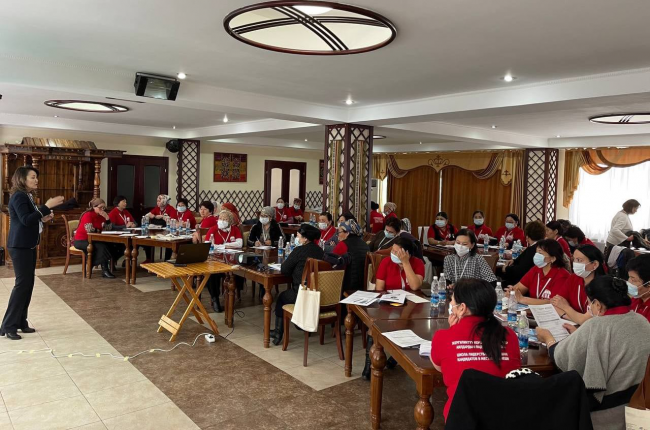36 women from project municipalities in Jalal-Abad region are ready to run for the elections to local councils

On February 25-27, 2021 Kochkor Ata town in Jalal-Abd region hosted a Leadership School for local councils’ women candidates, organized by the Public Service Improvement Project, funded by the Government of Switzerland through the Swiss Agency for Development and Cooperation and implemented by Helvetas Kyrgyzstan and the Development Policy Institute. During the three-day training they were trained on women leadership skills and participation in electoral processes for local councils in April 2021.
58-year-old Gulsara Kuttubaeva came to the training from Torken municipality in Toktogul district. She works as the head of the Adby Suerkulov museum and is the Chair of the Women's Council, as well as the monitoring and evaluation group. Despite her busy schedule, Ms. Kuttubaeva is always active in advocating women's rights in her village. In particular, she works closely with women with different degree of disability. Today, she is determined to run for a local parliamentary, as she believes that the problems of women and vulnerable groups have been neglected by the local authorities and no measures have been taken to address them. In her opinion, the knowledge acquired during the three-day training paved the way for her to run the local councils’ elections more confidently. Ms. Kuttubaeva was one of 36 participants from 13 project municipalities in Jalal-Abad region who successfully completed the course at the Leadership School for local councils’ women candidates in the framework of the Public Service Improvement Project.
This training was designed to contribute to increasing women`s participation in local council electoral processes through capacity building activities for potential female candidates in ayil aimaks. Among the participants there were young women who also benefited from the three-day training. Elnura Karabekova, a 28-year-old young professional, works as an accountant and is a resident of Burgondu municipality in Nooken district. She distinguished herself by coming to the training by successfully submitting her documents to the Territorial Election Commission (TEC). In addition to the main topics of the training, she also received useful advice from the trainers on development of her election program and the effective ways of conducting the election campaign.
Among the participants there was also a representative of ethnic minority, a 48-year-old Khazhimatova Movluda who came from Burgondu municipality. At the end of the training she noted that she was able to gain very useful knowledge regarding leadership skills, the legislation of the Kyrgyz Republic regulating the activities of LSG bodies, as well as the processes of state and local budgeting. "I became confident in my knowledge when I took a test at the end of the training. Unlike the first time, I was able to answer all the questions correctly. If I will be elected to the local council, I will raise questions on creating jobs for youth in the village. In recent years, all young people had to go to work in the Russian Federation after graduating from school. I would like to contribute to this issue and create some kind of working conditions for them. I think that the goal of the Project is to increase the potential of female candidates for deputies to local councils for their further more productive work, for which I would like to thank the organizers separately". At the moment the number of residents in Burgondu municipality is 10,470, out of whom 6,749 are the representatives of the Uzbek ethnicity. Among the 21 deputies working in the local council, 5 people are representatives of ethnic minorities, including the only female deputy in the entire municipality.
During the training, women exchanged experiences, actively participated in practical tasks, and asked questions about electoral processes. 5 participants, who were already registered as candidates for local councils at the time of the training, told about the difficulties they encountered when they applied for information to TECs. With the help of trainers and organizers of the training, the participants were able to get answers to urgent questions on the requirements of the CEC, in particular on financial support for the preparation and conduct of elections of local councils, the use of election fund, and the collection of lists of documents required for the registration of candidates for local council elections.
At the end of the training, the participants noted that the training encouraged them and if elected to the local councils, they are ready to use their knowledge and skills to the fullest extent for the benefit and development of their local communities.

